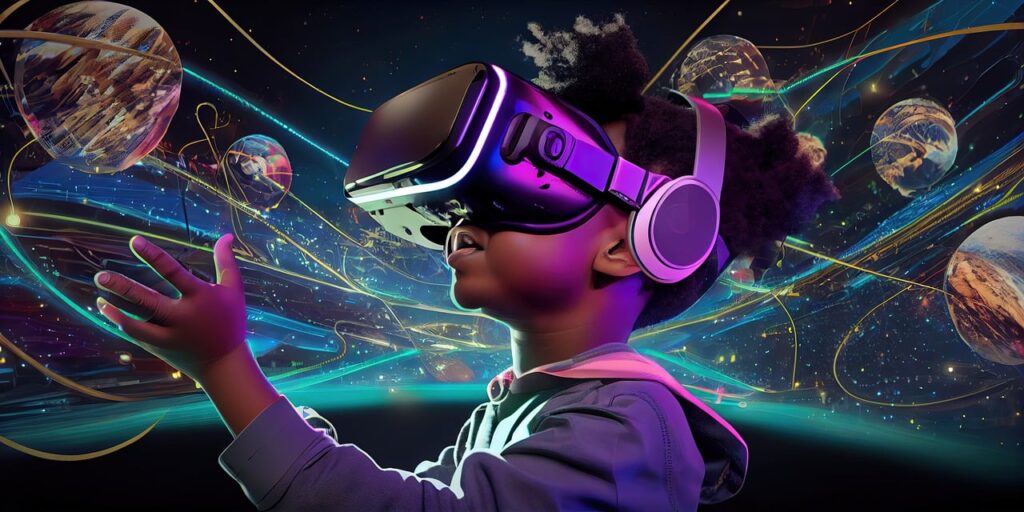The term “metaverse” has exploded in popularity, often associated with futuristic virtual reality experiences and the booming world of online gaming. However, the potential of the metaverse extends far beyond battling dragons or building pixelated empires. This immersive, interconnected network of virtual worlds holds the promise to revolutionize how we work, learn, and connect with others. Let’s delve deeper into the potential applications of the metaverse beyond the realm of gaming.
Transforming the Workplace:
The metaverse offers a unique opportunity to reimagine the traditional office environment. Imagine attending meetings in virtual conference rooms where avatars collaborate on 3D models or brainstorm ideas using interactive whiteboards. Geographical limitations would become a relic of the past, allowing teams from across the globe to seamlessly work together in a shared virtual space.
Enhanced Collaboration and Communication:
The metaverse goes beyond simple video conferencing. Virtual avatars equipped with facial recognition and gesture tracking can create a more natural and engaging communication experience. Brainstorming sessions can take on a new dimension, with participants manipulating 3D objects in real-time to represent ideas. Additionally, the metaverse can facilitate remote training programs through immersive simulations, allowing employees to gain practical experience in a safe virtual environment.
Improved Work-Life Balance:
The metaverse has the potential to improve work-life balance by offering a more flexible and location-independent work style. Imagine attending meetings or collaborating on projects from the comfort of your home office, eliminating the need for lengthy commutes. This can lead to increased productivity and a better balance between professional and personal life.
Challenges and Considerations in the Metaverse Workplace:
While the metaverse offers exciting possibilities for the workplace, challenges remain. Issues like cybersecurity, data privacy, and ensuring accessibility for all employees need to be addressed. Additionally, establishing clear guidelines for virtual work etiquette and preventing burnout in a constantly connected environment are crucial considerations.
Revolutionizing Education:
The metaverse can transform the educational landscape from primary school to higher learning. Imagine attending history classes where you can walk through recreated historical sites or participate in simulations of scientific experiments. This immersive approach to learning can foster deeper engagement and understanding of complex concepts.
Personalized Learning Experiences:
The metaverse allows for personalized learning experiences tailored to individual needs and learning styles. AI-powered tutors within the metaverse can analyze a student’s progress and provide customized instruction. Additionally, virtual reality simulations can create safe and controlled environments for students to practice skills or learn about potentially dangerous subjects.
Accessibility and Collaboration:
The metaverse can bridge geographical and physical barriers to education. Students from remote locations or those with disabilities can access world-class educational opportunities within a virtual environment. Additionally, the metaverse can foster collaboration between students across the globe, allowing them to work on projects and share ideas in real-time.
Challenges and Considerations in Metaverse Education:
Ensuring equitable access to technology and creating a safe and inclusive virtual environment for all students are critical considerations. Additionally, developing engaging and effective curriculum specifically designed for the metaverse is crucial for maximizing its potential in education.
Redefining Social Interaction:
The metaverse promises to redefine how we connect with others. Imagine attending concerts with friends from around the world in virtual venues, or visiting virtual museums and art galleries with your significant other. These immersive experiences can foster a sense of connection and shared experience that transcends physical limitations.
Virtual Communities and Shared Experiences:
The metaverse can foster the creation of vibrant virtual communities based on shared interests or hobbies. People can connect, socialize, and participate in activities within these virtual spaces, creating a sense of belonging and camaraderie. Additionally, the metaverse can be a valuable tool for those with social anxieties or physical limitations, allowing them to connect with others in a comfortable and safe environment.
Privacy Concerns and the Need for Balance:
While the metaverse offers exciting possibilities for social interaction, privacy concerns need to be addressed. It’s crucial to develop clear guidelines for data collection and usage within the metaverse. Additionally, it’s important to maintain a healthy balance between virtual and real-world social interaction to avoid isolation and social withdrawal.
The Future of the Metaverse: A Blend of Reality and Virtuality
The metaverse is still in its nascent stages, but its potential to transform how we work, learn, and connect is undeniable. As technology continues to evolve, we can expect a future where the boundaries between the physical and virtual world become increasingly blurred. The metaverse may not entirely replace our physical interactions, but it promises to become a seamless extension of our reality, offering new avenues for work, education, and social connection. However, responsible development and ethical considerations are paramount to ensure the metaverse benefits all of humanity and creates a truly inclusive and enriching experience for everyone.


